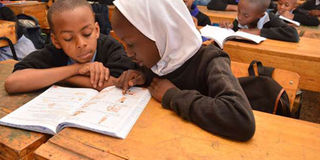Here’s one crazy idea for education reform to start off 2017

Pupils of Moi Avenue Primary in Nairobi start their classes on January 4, 2017. There has been a lot of activity and excitement since Fred Matiang’i moved to the Education docket. PHOTO | DENNIS ONSONGO | NATION MEDIA GROUP
What you need to know:
- He has certainly brought in efficiencies and shaken up the rot that bedevilled the country’s examination system.
- There is no sign that the country is more innovative, suggesting that it was not the smartest thing to do.
There is a lot of crying for “education reform” in East Africa, especially in Kenya and Uganda.
And there is also a lot of tinkering in the two countries.
In Kenya, there has been a lot of activity and excitement since Fred Matiang’i moved to the Education docket as Cabinet secretary last year.
He has certainly brought in efficiencies and shaken up the rot that bedevilled the country’s examination system.
Uganda has been at it longer. In a move to encourage “industralisation” and innovation, government sponsorship for arts and social science degrees was whittled down dramatically.
There is no sign that the country is more innovative, suggesting that it was not the smartest thing to do.
Now there are reports of plans to scrap subjects such as music, home economics, wood work, and so on.
One sign that this is a poorly conceived idea is that subjects such as religious education are being retained.
Musicians, carpenters, and chefs do more to grow an economy and create jobs than Bible reading, except for the preachers of the prosperity gospel.
All said, education reform is difficult to do because it is very hard to tie it to outcomes.
ORGAN TRANSPLANT
You can invest in the best education for doctors, for example, but that will not give you a good health care system.
If I were given a little country to run according to my whims, and to set up an education system, I would only require that it trains “productive creative thinkers and practical-minded individuals in all subjects”.
We shall give an example. One of my favourite sources for intelligent and often quirky insights about the affairs of the world is the American website, Slate.
A few days ago it had a brilliant article about driverless cars, noting that “a lot has been said about the ways we expect our oncoming fleet of driverless cars to change the way we live — remaking us all into passengers, rewiring our economy, retooling our views of ownership, and reshaping our cities and roads”.
However, it said one thing not being discussed is that “they will also change the way we die.
As technology takes the wheel, road deaths due to driver error will begin to diminish.
It is a transformative advancement, but one that comes with consequences in an unexpected place: organ donation”.
Nearly 6,500 Americans die waiting for an organ transplant each year, it noted.
Now more could die because “among the most reliable sources for healthy organs and tissues are the more than 35,000 people killed each year on American roads”.
So, while it is a morbid truth, if people stop dying in car crashes, organs for transplants will just disappear.
START EARLY
The point of the article was that America needed to begin preparing for that time.
Presumably, safe driverless cars could be a big boost for industries making artificial body parts and cloning.
It is the ability to make those kinds of connections, and to act to take advantage of them, that should be the primary reason for a good education system today.
But how to achieve that in an African context?
The single action that could begin to achieve that is to turn high schools, colleges, and universities into places for the study of applied sciences and arts.
Students can study any subject — music, dance, history, geography, religion, statistics, computer science, architecture, maths, cooking, and design.
The only thing they would have to do is show what they intend to do with it.
If you want to produce a play, read all the great African plays you want.
PLANNING
You want to make a documentary on the Mau Mau uprising, knock yourself out with Mau Mau history.
You think the papyrus in Kenya’s swamps can be a new building material, get all the money you want to study architecture.
Want to end drought? Then the state will do everything to help you study climate science.
The students will not all succeed in making their plans come true, but this approach creates an important demand loop into how to allocate resources to education.
Secondly, it will begin to align means and ends.
If this year no one wants to study Kiswahili, fair enough, you do not spend money on it.
If next year thousands demand it, you pour money into it.
Of course, planning education needs a longer time frame.
Even matatu routes are not haphazard, but scheduling is an easier problem to fix than the harm of a crappy education system.
The author is publisher of Africa data visualiser Africapedia.com and explainer site Roguechiefs.com. Twitter@cobbo3





